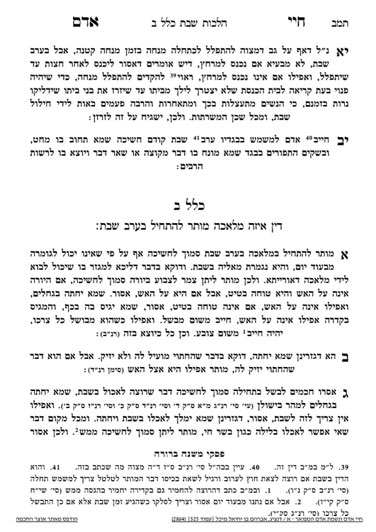We are continuing in siman 11, where the Chayei Adam discusses davening mincha gedolah on erev Shabbos. Yesterday, we discussed the potential halachic concerns that would necessitate davening mincha earlier, which were the merchatz or a haircut. Today, we will discuss an additional, practical concern brought up by the Chayei Adam.
The Chayei Adam writes that even if a person does not have the above mentioned halachic concerns, it is still proper to daven mincha gedolah. He explains that when they (the shul gabbaim) announce throughout the town that it is time for mincha right before sunset, it is theoretically appropriate to wait at home for a few minutes and not to run immediately to shul. However, he will miss Mincha. The mishnah tells us that prior to the onset of Shabbos, a husband should ask his family members if they have made eruvei chatzeiros, separated maasros from the produce, and, if they have not lit, instruct them to light Shabbos candles. If a person goes to shul before the time of lighting, they will not be home, so they will be unable to instruct their family. Therefore, the Chayei Adam suggests davening mincha earlier, so that the husband can be home closer to the onset of Shabbos and fulfill this mishnah. The Mishnah Berurah, however, does not mention the idea of davening early for this concern.
The poskim explain that the reason for these instructions was out of concern for women who are not diligent about lighting Shabbos candles on time. Additionally, people would have Jewish assistants at home who were not knowledgeable about hilchos Shabbos. However, if one knows their wife is diligent in this area, they do not need to be concerned for the Chayei Adam’s point.
The mishnah specifies that the husband asks about eruvei chatzeiros. Eruvei chatzeiros is effected by taking contributions of food from members of the area which wishes to join together. Eruvei chatzeiros is done nowadays by the rav of a shul, usually using a box of matzah, and is kept for an entire year. However, it used to be that they would make a new eruv chatzeiros every week, and people would contribute challah rolls every week to the eruv. Eruvei techumin would be created depending on the need, so one did not need to ask their family every week. Eruvei tavshilin is only relevant when Yom Tov falls out on Friday, so there was no need to ask the family.
Since the eruv chatzeiros is no longer performed by the individual, we no longer ask the question about eruvei chatzeiros. Similarly, separating maasros is not done outside of Eretz Yisroel, so the question is no longer asked either.
The poskim discuss whether the husband has a responsibility to ask his wife if she separated challah, which is technically a form of maasros. The Daas Kedoshim, in his sefer Aishel Avraham of Butchatch, answers this question. He writes that the reason the minhag has come about to call the bread eaten on Shabbos, “challah”, even though challah is technically the part which is separated and not eaten, is as a reminder to separate the challah from that dough. Therefore, he writes that there is no need to ask the family if they separated the halachic challah.
Summary
- Although it is generally preferable to daven mincha ketana, on erev Shabbos it is preferable to daven mincha gedolah.
- The concern can be halachic, such as davening before getting a haircut or going to the merchatz, or it can be practical, to be home in order to ensure the final Shabbos preparations of eruvei chatzeiros, maasros, and lighting Shabbos candles are done before Shabbos.
- Regarding the halachic concern, it is uncommon to find a bathing facility which has the halachic status of a merchatz.
- This is a chumra, as there are opinions that the requirement to daven Mincha first, starts with Mincha ketana.
- Regarding the practical concern of ensuring final Shabbos preparations are done, if one is sure their family will be diligent in these areas, they do not need to be concerned.



